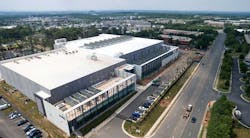CyrusOne’s ability to build data centers fast has helped the developer win a series of major deals with cloud providers. The company’s focus on lean construction and pre-fabricated components allows it to deliver new data centers in six to nine months .
“We’re constantly focusing on shortening our time to market and lowering costs for our customers,” said Kevin Timmons, the Chief Technology Officer of CyrusOne. “We’re completely focused on that.”
As the company’s rivals retool their construction supply chains to compete, CyrusOne believes it can kick its operations into a higher gear. Timmons says the company’s new partnership with Chinese developer GDS will help it build data centers even faster and at lower cost.
“We think we can do something really different in the market,” said Timmons. “The way we share technology and best practices (with GDS) offers lots of possibilities.”
$100 Million Investment in GDS
In October CyrusOne announced a $100 million equity investment in GDS, a publicly-held company that builds data centers for Chinese cloud computing providers. As part of the deal, CyrusOne president and chief executive officer Gary Wojtaszek will join the GDS board of directors.
GDS operates 17 data centers offering about 1.2 million square feet of colocation space, with a customer list that includes the marquee names in Chinese cloud computing – Alibaba, Tencent, Baidu and Huawei. Cloud customers account for 51 percent of the company’s revenue.
“They’re the fastest-growing hyperscale data center builder in China,” said Timmons.
Early discussion of the CyrusOne-GDS partnership has focused on benefits of cross-selling between the companies’ US and Chinese customer bases. But the partnership also includes “cross-pollenization” of data center design and engineering. This includes access to GDS’ network of Chinese manufacturers and fabricators, who could help CyrusOne reduce costs in its supply chain.
The Supply Chain as Battleground
“These are industrial facilities, and we look at them as a supply chain play,” said Timmons. “GDS has established deep relationships with quality Chinese manufacturing companies. They have a lot of great relationships with integrators and fabricators. We look forward to being able to tap into that.
“In hardware, the sky’s the limit,” Timmons said. “We’re huge consumers of cage material and cabling, for example. Imagine us sourcing our own UPS systems and generation. It’s a very real possibility. It’s very early days, but this is the promise of it.”[clickToTweet tweet=”CyrusOne CTO Kevin Timmons: Imagine us sourcing our own UPS systems and generation. It’s a very real possibility.” quote=”CyrusOne CTO Kevin Timmons: Imagine us sourcing our own UPS systems and generation. It’s a very real possibility.”]
As the tech sector’s largest names invest heavily in the cloud, they are looking to quickly deploy tens of thousands of new servers. To meet this demand, Leading wholesale data center providers have optimized their designs and construction methodologies to deliver lots of space, as quickly as possible.
They are also leaning on their supply chain for faster delivery of key electrical and mechanical equipment, including backup generators, UPS units and HVAC equipment.
Why Speed Matters
CyrusOne executives say the ability to deliver space quickly has helped it win deals from cloud builders who want a lot of space, and want it fast.
“We always want to be the partner that can deliver space faster than anyone else,” said Timmons. “It’s ingrained in our DNA. It requires deep relationships with infrastructure providers. We marry that with our passion for pre-construction. When you have a consistent design, consistent partners and an established supply chain, you get great predictability.”
CyrusOne cites two projects that showcased the company’s ability to deliver space quickly:
- A turn-key data hall within a powered shell in Chandler, Arizona, which was delivered in just 107 days.
- The Sterling II project in Northern Virginia, which went from a dirt field to a finished 30-megawatt data center in six months.
The Sterling project was fully pre-leased to a major cloud provider, and built at a cost of just $6.3 million per megawatt, among the lowest in the industry. The building offers a 16 percent return on invested capital for CyrusOne, above the 11 to 15 percent returns seen for other real estate investment trusts (REITs) specializing in data center construction.
Timmons says these projects have helped shift expectations about delivery times in the data center market.
“We don’t get many customers that come to us and want inventory in 18 months,” he said.
More Disruption Ahead?
International partnerships are already a strategic factor in the server and storage sector, where large cloud providers now work closely with original design manufacturers (ODMs), including several based in Taiwan. Facebook has used similar strategies sourcing custom UPS units. CyrusOne is hoping it can bring disruption to its data center supply chain through GDS and its relationships with suppliers.
While the full potential of the partnership is not yet visible, what’s clear is that CyrusOne will continue to seek ways to improve its construction operation.
“We focus so much on ultra-optimizing our speed to market,” said Timmons. “We’re constantly trying to innovate in a way that makes sense to us and works for our customers. The immediate benefit is that we’ve got a sister company that really excels at being a hyperscale player in a different market.”
High Hopes for Atlanta
Meanwhile, CyrusOne continues to add new data center capacity, and lots of it. Last month the company confirmed that it will build a large data center campus near Atlanta, which is quickly becoming a major hub for new development. Switch has also announced plans for a major campus in the Atlanta suburbs, and reports emerged last week that Facebook will build a new data center in the region.
CyrusOne plans to build a 44-acre campus in the Atlanta suburb of Douglasville, that will house three data centers, with 440,000 square feet of data center space and 50 megawatts of critical power.
Timmons said CyrusOne is bullish on the potential for the Atlanta market.
“It’s not hard to imagine Atlanta following in the footsteps of Northern Virginia,” said Timmons. “The fill rates for current data centers are very strong. There’s obviously a need, and I think there hasn’t been a product like ours in that market. We think someday Atlanta will be secondary to only the Northern Virginia market.”
About the Author



